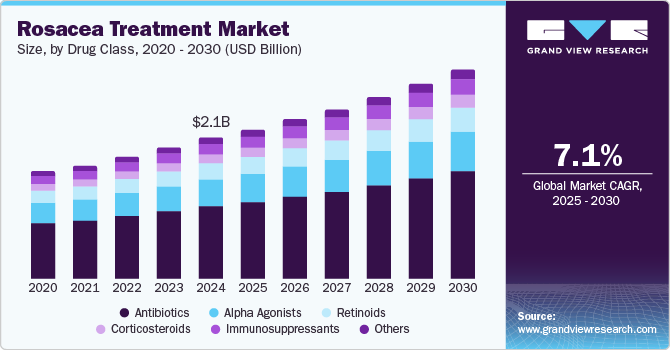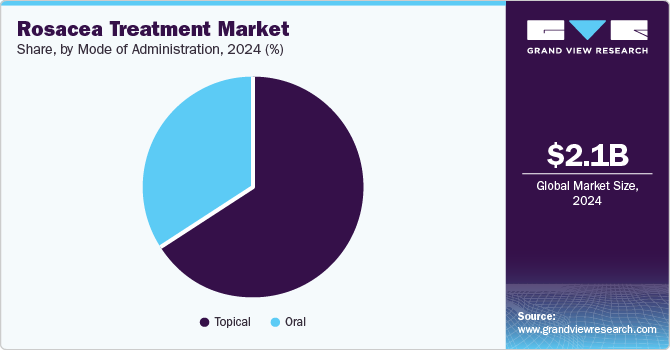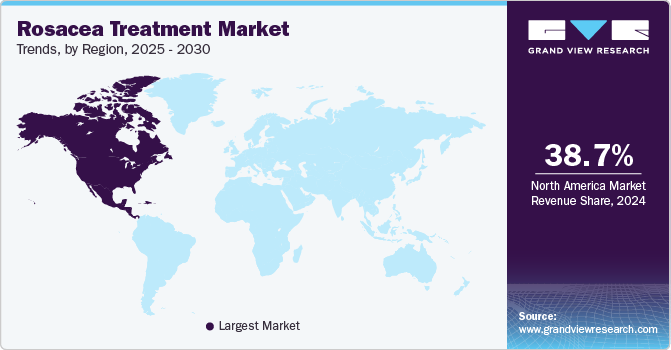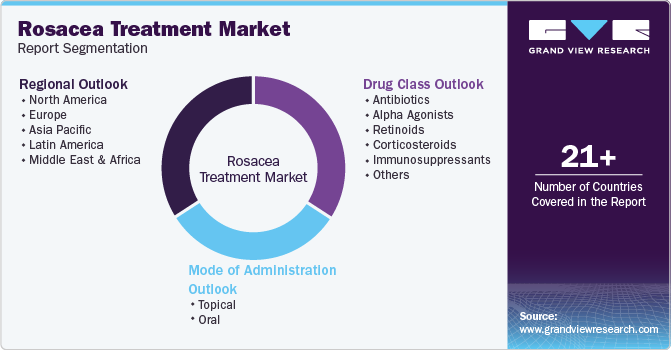- Home
- »
- Pharmaceuticals
- »
-
Rosacea Treatment Market Size, Industry Report, 2030GVR Report cover
![Rosacea Treatment Market Size, Share & Trends Report]()
Rosacea Treatment Market (2025 - 2030) Size, Share & Trends Analysis Report By Drug Class (Antibiotics, Alpha Agonists, Retinoids, Corticosteroids), By Mode Of Administration (Topical, Oral), By Region, And Segment Forecasts
- Report ID: GVR-2-68038-739-1
- Number of Report Pages: 100
- Format: PDF
- Historical Range: 2018 - 2023
- Forecast Period: 2025 - 2030
- Industry: Healthcare
- Report Summary
- Table of Contents
- Interactive Charts
- Methodology
- Download FREE Sample
-
Download Sample Report
Rosacea Treatment Market Size & Trends
The global rosacea treatment market was estimated at USD 2.08 billion in 2024 and is projected to grow at a CAGR of 7.1% from 2025 to 2030. The increasing prevalence of rosacea is largely due to urbanization, environmental changes, and lifestyle shifts, particularly among fair-skinned individuals. As more cases are diagnosed, the demand for effective treatments is rising. As rosacea is more common in middle-aged and older adults, the rapidly rising aging population globally is contributing to the demand for effective treatments. With these rising numbers, there is a greater need for improved treatment and management options. These factors combined are driving the high incidence of rosacea worldwide.

Advancements in rosacea treatments have led to new options such as targeted biologics, oral medications, and topical treatments. These innovative therapies offer more effective and personalized treatment plans for patients, contributing to the growth of the rosacea treatment industry. In addition, the use of combination therapies, such as combining antibiotics with topical treatments or light therapy with oral medications, has become more common. These combinations improve patient outcomes by addressing multiple aspects of the condition simultaneously. Hence, the demand for these advanced treatments is increasing. These developments are expanding treatment choices and driving further growth in the market.
Rosacea can cause visible facial redness, pimples, and visible blood vessels, which often have significant cosmetic and psychological effects on patients. Treatments that improve their looks and boost self-esteem are in high demand as people place more importance on their appearance. Non-invasive treatments, such as laser therapy, Intense Pulsed Light (IPL) treatments, and other dermatological procedures, are becoming increasingly popular for managing rosacea. This growing demand for non-invasive options is contributing to the expansion of the rosacea treatment industry.
Drug Class Insights
The antibiotics segment dominated the market with a revenue share of 51.3% in 2024 due to their established role as first-line therapies for rosacea. These medications, including metronidazole and doxycycline, effectively reduce inflammation and bacterial presence, addressing the condition's primary symptoms. Their long-standing use and proven efficacy have made them a staple in treatment protocols. In addition, the high rate of prescriptions and patient adherence to antibiotic regimens contribute to the segment's robust market position in the rosacea treatment industry. The growing awareness of rosacea and its treatments further supports the demand for antibiotics among healthcare providers.

The alpha agonists segment is anticipated to grow at the highest CAGR of 7.5% over the forecast period, fueled by their effectiveness in managing facial erythema associated with rosacea. Products such as Mirvaso and Rhofade specifically target redness, offering patients rapid relief from visible symptoms. The increasing recognition of these agents as viable treatment options has led to greater adoption among dermatologists. As more patients seek solutions for persistent redness, the alpha agonists segment is expected to gain traction, reflecting a shift toward more specialized therapies in the rosacea treatment industry.
Mode Of Administration Insights
The topical segment dominated the market with the largest revenue share in 2024, which can be attributed to its convenience and effectiveness in treating localized symptoms. Both patients and physicians prefer topical treatments such as gels and creams due to their ease of application and direct action on affected areas. The availability of various formulations that combine multiple active ingredients enhances their appeal. Furthermore, ongoing research into new topical agents continues to expand treatment options, solidifying the dominance of this segment in the rosacea treatment industry.
The oral segment is projected to grow at a significant CAGR over the forecast period due to its effectiveness in treating more severe cases of rosacea. Oral antibiotics provide systemic relief from inflammation and bacterial infection, which can be crucial for patients with extensive or resistant symptoms. The rising prevalence of rosacea among diverse populations drives demand for oral therapies as part of comprehensive treatment plans. As healthcare providers increasingly recognize the importance of combination therapy, oral treatments are expected to see sustained growth alongside topical options.
Regional Insights
North America rosacea treatment market held the highest revenue share of 38.7% in 2024 due to a combination of factors, including high consumer awareness and advanced healthcare infrastructure. The region benefits from a well-established network of dermatology specialists adept at diagnosing and treating rosacea effectively. In addition, continuous innovation in treatment options and frequent drug approvals contribute to market growth. Increased exposure to environmental triggers also elevates the incidence of rosacea, further driving demand for effective treatments in this region.

U.S. Rosacea Treatment Market Trends
The U.S. rosacea treatment market dominated North America with a significant revenue share in 2024, fueled by high healthcare expenditure and access to advanced medical treatments. The presence of leading pharmaceutical companies and ongoing research initiatives enhance the availability of innovative therapies tailored for rosacea patients. Patient education campaigns have also improved recognition of symptoms, prompting individuals to seek timely treatment. This proactive approach among consumers increases prescription rates for effective therapies, reinforcing the country's leading position within the North American market.
Europe Rosacea Treatment Market Trends
Europe rosacea treatment market held a substantial market share in 2024, driven by increasing awareness and accessibility to dermatological care. The region benefits from a strong emphasis on skincare and health education, leading to early diagnosis and management of rosacea symptoms among patients. In addition, advancements in treatment technologies and a growing portfolio of effective medications support market expansion. The rising number of clinical studies focused on rosacea also contributes to a better understanding of treatment options available in Europe.
Asia Pacific Rosacea Treatment Market Trends
Asia Pacific rosacea treatment market is expected to register the highest CAGR of 8.6% over the forecast period, which can be attributed to improving healthcare infrastructure and rising disposable incomes. As economies grow within this region, there is an increased focus on health awareness and access to medical care, leading more individuals to seek treatment for skin conditions such as rosacea. The growing prevalence of skin disorders due to environmental factors drives demand for effective treatments. Enhanced availability of dermatological services further supports this growth trajectory.
The China rosacea treatment market dominates the Asia Pacific with a significant revenue share in 2024, driven by rapid urbanization and changing lifestyle factors contributing to skin conditions. Increased exposure to pollution and stressors in urban environments has led to a rise in skin-related issues among the population, including rosacea. Moreover, increased awareness about skin health through media and educational platforms encourages individuals to seek appropriate treatments. The expansion of healthcare facilities offering specialized dermatological services also plays a crucial role in supporting this market's growth in China.
Key Rosacea Treatment Company Insights
Some key companies operating in the market are AbbVie Inc., Bayer AG, Bausch Health Companies Inc., Nestlé Skin Health, and Sol-Gel Technologies Ltd. Companies are undertaking strategic initiatives, such as mergers, acquisitions, and product launches, to expand their market presence and address the evolving healthcare demands in the rosacea treatment market.
-
AbbVie Inc. offers a range of products for treating rosacea. These include brimonidine tartrate (Mirvaso), a topical gel that quickly reduces facial redness; metronidazole and azelaic acid, which help decrease inflammation and lesions; and ivermectin (Soolantra), which addresses inflammation and targets Demodex mites. The company is dedicated to developing innovative therapies that manage the various symptoms of rosacea and improve dermatology patient care.
-
Bayer AG offers various products for rosacea treatment. It offers Finacea (azelaic acid) Foam, 15%, which is designed to manage inflammatory papules and pustules associated with mild to moderate rosacea. The company also offers Finacea gel containing azelaic acid for similar uses. The company emphasizes patient support by providing resources that enhance treatment adherence and educate patients about managing rosacea.
Key Rosacea Treatment Companies:
The following are the leading companies in the rosacea treatment market. These companies collectively hold the largest market share and dictate industry trends.
- AbbVie Inc.
- Bayer AG
- Bausch Health Companies Inc.
- Nestlé Skin Health
- Sol-Gel Technologies Ltd.
- Mayne Pharma Group Limited
- LEO Pharma A/S
- Pfizer Inc.
- Aclaris Therapeutics, Inc.
- Galderma
Recent Developments
-
In October 2023, AbbVie announced that Upadacitinib (RINVOQ) successfully met the primary endpoint in a Phase 2 clinical trial for treating vitiligo. The trial demonstrated significant improvements in skin repigmentation among participants, marking a promising advancement in managing this autoimmune condition. Following these positive results, the company indicated that the program would progress to Phase 3 trials, further evaluating the efficacy and safety of Upadacitinib.
-
In June 2022, Galderma launched EPSOLAY Cream, a significant advancement in treating bumps and blemishes associated with rosacea. This FDA-approved cream contains 5% benzoyl peroxide and is the first microencapsulated formulation designed to provide effective relief for chronic skin conditions. In clinical trials, EPSOLAY Cream demonstrated up to a 43.7% reduction in lesions within two weeks and nearly 70% after 12 weeks. The innovative microencapsulation technology allows for a gradual release of the active ingredient, enhancing tolerability for sensitive skin.
Rosacea Treatment Market Report Scope
Report Attribute
Details
Market size value in 2025
USD 2.22 billion
Revenue forecast in 2030
USD 3.12 billion
Growth rate
CAGR of 7.1% from 2025 to 2030
Base year for estimation
2024
Historical data
2018 - 2023
Forecast period
2025 - 2030
Quantitative units
Revenue in USD billion and CAGR from 2025 to 2030
Report coverage
Revenue forecast, company ranking, competitive landscape, growth factors, trends
Segments covered
Drug class,mode of administration, region
Regional scope
North America; Europe; Asia Pacific; Latin America; Middle East & Africa
Country scope
U.S., Canada, Mexico, UK, Germany, France, Italy, Spain, Norway, Denmark, Sweden,Japan, China, India, South Korea, Australia, Thailand, Brazil, Argentina, South Africa, Saudi Arabia, UAE, Kuwait
Key companies profiled
AbbVie Inc.; Bayer AG; Bausch Health Companies Inc.; Nestlé Skin Health; Sol-Gel Technologies Ltd.; Mayne Pharma Group Limited; LEO Pharma A/S; Pfizer Inc.; Aclaris Therapeutics, Inc.; Galderma.
Customization scope
Free report customization (equivalent up to 8 analysts working days) with purchase. Addition or alteration to country, regional & segment scope.
Pricing and purchase options
Avail customized purchase options to meet your exact research needs. Explore purchase options
Global Rosacea Treatment Market Report Segmentation
This report forecasts global, regional, and country revenue growth and analyzes the latest industry trends in each sub-segment from 2018 to 2030. For this study, Grand View Research has segmented the global rosacea treatment market report based on drug class, mode of administration, and region:

-
Drug Class Outlook (Revenue, USD Billion, 2018 - 2030)
-
Antibiotics
-
Alpha Agonists
-
Retinoids
-
Corticosteroids
-
Immunosuppressants
-
Others
-
-
Mode of Administration Outlook (Revenue, USD Billion, 2018 - 2030)
-
Topical
-
Oral
-
-
Regional Outlook (Revenue, USD Billion, 2018 - 2030)
-
North America
-
U.S.
-
Canada
-
Mexico
-
-
Europe
-
UK
-
Germany
-
France
-
Italy
-
Spain
-
Norway
-
Denmark
-
Sweden
-
-
Asia Pacific
-
Japan
-
China
-
India
-
South Korea
-
Australia
-
Thailand
-
-
Latin America
-
Brazil
-
Argentina
-
-
Middle East & Africa
-
South Africa
-
Saudi Arabia
-
UAE
-
Kuwait
-
-
Share this report with your colleague or friend.
Need a Tailored Report?
Customize this report to your needs — add regions, segments, or data points, with 20% free customization.

ISO 9001:2015 & 27001:2022 Certified
We are GDPR and CCPA compliant! Your transaction & personal information is safe and secure. For more details, please read our privacy policy.
Trusted market insights - try a free sample
See how our reports are structured and why industry leaders rely on Grand View Research. Get a free sample or ask us to tailor this report to your needs.










